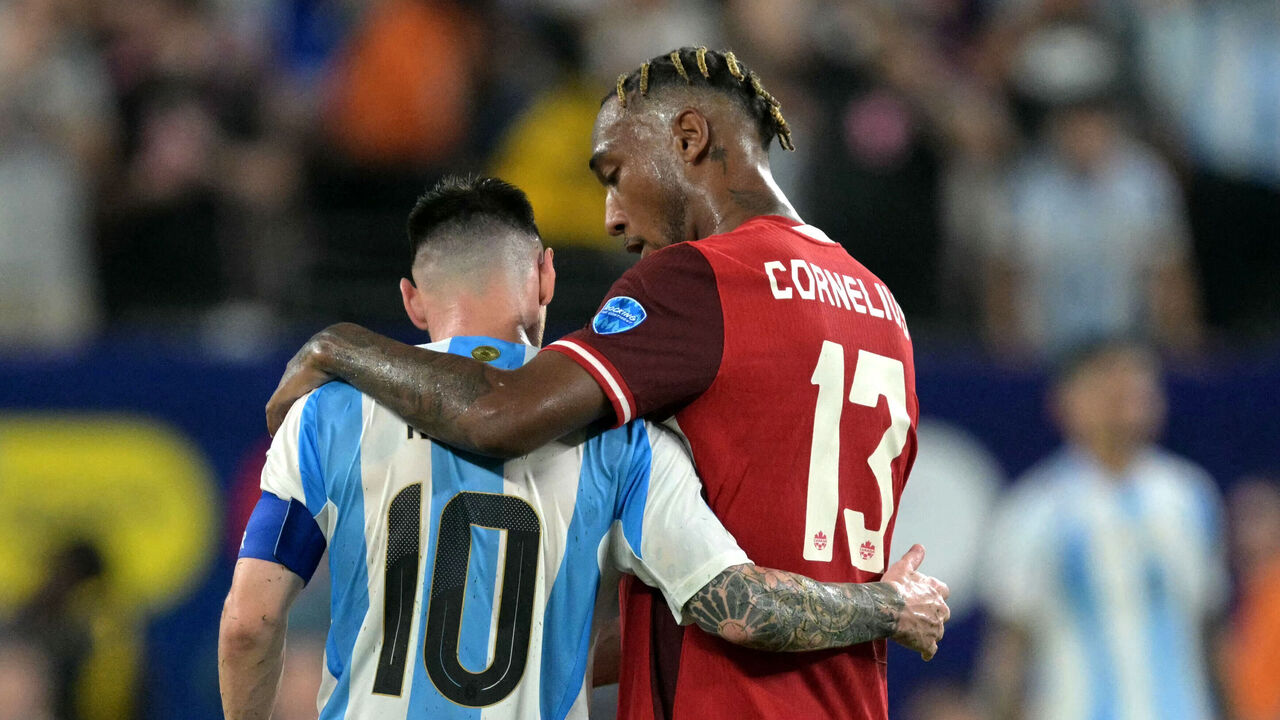Canada learns another hard lesson about top-tier soccer
Lautaro Martinez is one of the best strikers in the world. He scored 24 goals last season, the most in the Italian top flight by some distance, for Serie A champions Inter Milan.
And against Canada in the semifinal of the Copa America, his talents were surplus to requirements. He didn't enter Tuesday's game until the 78th minute, trotting on to replace Julian Alvarez, who had scored the first goal of Argentina's 2-0 win.
It says something about the challenge Canada faced against Argentina that a player like Martinez, who has scored 103 goals for Inter, came on for mop-up duty. By comparison, the list of Canadians who have even played in Italy's top tier is one name long: Tajon Buchanan, Martinez's club teammate. He has scored one league goal.
Argentina is a powerhouse, is the point. The defending Copa America champion and reigning World Cup holder has shaken off years of frustration born from trying to live up to the legacy of Diego Maradona and figured out the best way to get the most out of Lionel Messi, the best player in the world. Everyone else, a mix of youth and experience, works really hard, and then Messi swoops in occasionally for a moment of magic. The battle station is fully armed and operational.
The system, such as it is, was on display in Argentina's back-breaking second goal. A throw-in deep in the Canadian half to Messi, who dribbles for a beat before finding Rodrigo De Paul in space. Chaos ensues for a few seconds, then Messi deflects a shot past Maxime Crepeau, the Canadian goalkeeper. Ball game, basically.
It was always going to be difficult to stop this machine. But the Canadians gave it a shot. Once again, the team came out playing the aggressive style that new head coach Jesse Marsch preaches, trying to at least trade punches with Argentina instead of sitting back in a defensive shell. After 20 minutes, the shot count was 3-2 for Canada, although neither team had managed one inside the frame.
And then suddenly, it was broken open. A speculative long pass from De Paul, taken down with grace and skill by Alvarez in a too-wide gap between Canada's defenders, and the ball was expertly slotted under an on-rushing Crepeau. Up to that point, the Canadians had created more of the chances, with different combinations of Jonathan David, Cyle Larin and Jacob Shaffelburg trying to hit Argentina on the break, but they couldn't quite get the final pass right.
Compared to all of Canada's hard work and no finish, the Alvarez goal was almost brutally efficient.

Canada ultimately learned the same lesson under Marsch at the Copa America that it learned under John Herdman at the Qatar World Cup: To hang with the best soccer nations, it has to get better at converting its chances.
That Canada was even in a position to learn this lesson at this tournament remains something of a feat for the program. With Marsch only taking over in May, and the team's first outing under him a 4-0 thumping from the Netherlands, it was reasonable to expect the Copa, big stage though it is, would mostly be an exercise in Marsch getting a feel for his squad in competitive games. The former Leeds United boss said something to that effect himself in the lead-up: Canada wanted to play well, but the main value in the Copa was to gain experience for the 2026 World Cup on home soil.
And then Canada arrived and went further in the tournament than Brazil. Brazil!
After the team's struggles following the World Cup, Canadian fans could be forgiven for wondering if the team had peaked too early. The ride through CONCACAF qualifying had been thrilling, but the team was stretched a little thin, physically and financially. The aimless play post-Qatar and the extended search for a new coach underscored the sense of malaise.
Marsch, though, seems to have sorted much of that out in a hurry. Alphonso Davies, the group's one true superstar, didn't seem quite ready for the role of team leader in Qatar; he's now the captain and has embraced all that comes with it. Marsch has returned Davies to the terrorizing left-back role he plays at Bayern Munich, replaced the entire central defense, and found a new goalkeeper in Crepeau, who's already stitched his name into Canadian lore with his shootout heroics against Venezuela in the Copa quarterfinals.
The question now is whether Marsch-ball has legs. The high-octane style has its critics, including those Leeds United fans who thought he ran the team into the ground before losing his job there last year. But the results with Canada so far are undeniable: a draw against France in a pre-Copa friendly, followed by the men's team's best-ever performance at a major non-CONCACAF tournament. No one loves moral victories, but Canada held its own against Argentina, twice.
The next test for Marsch's new-look squad comes in the fall with friendlies against old rivals Mexico and the United States. Each of those games will involve a team whose national program is in something of a crisis. And, amazingly, given the history, it's not Canada.
Scott Stinson is a contributing writer for theScore.